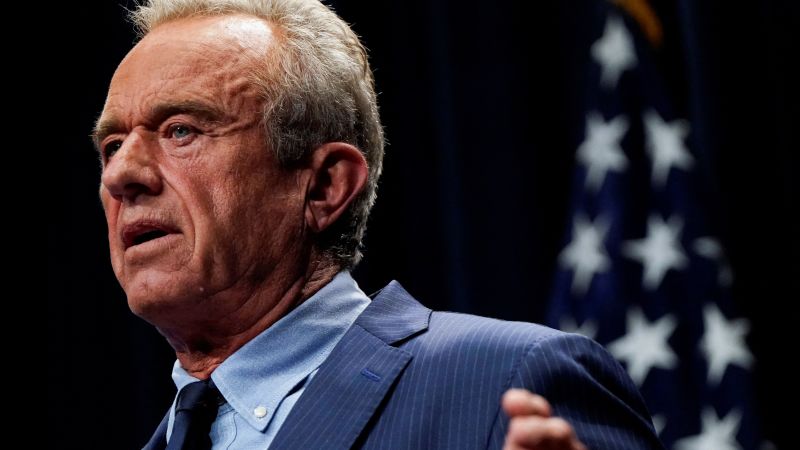On June 21, 2023, in a significant shakeup within the U.S. public health system, Secretary of Health and Human Services Robert F. Kennedy Jr. undertook a drastic measure by entirely disbanding the U.S. Centers for Disease Control and Prevention’s (CDC) vaccine advisory panel. Following this decision, he promptly appointed several prominent figures who have been vocal critics of the government’s response to Covid-19 to the Advisory Committee on Immunization Practices (ACIP). This reconstitution of the committee aims to reshape vaccine policy at a time when public trust in vaccines is wavering.
The ACIP, originally established in 1964, holds a critical role in determining vaccine recommendations in the U.S. The group, typically comprised of pediatricians, immunologists, researchers, and patient advocates, is responsible for assessing vaccine safety and efficacy and making recommendations on who should receive which vaccines. These recommendations significantly influence vaccination coverage decisions made by insurers and medical professionals.
Kennedy’s announcement of eight new members to the ACIP raised eyebrows and sparked intense debate within the medical community. The individuals chosen reflect a departure from the traditional profile expected of advisory committee members. Among the notable appointees, Dr. Robert Malone, a biochemist associated with early developments in mRNA technology, has more recently become a known critic of mRNA Covid-19 vaccines. His inclusion, alongside others such as Dr. Martin Kulldorff — a biostatistician and epidemiologist known for advocating the Great Barrington Declaration on herd immunity — signals a shift towards an agenda valuing skepticism of prevailing vaccine strategies.
Kennedy emphasized that these new committee members would demand “definitive safety and efficacy data” prior to endorsing any new vaccine recommendations, including those for Covid-19 and human papillomavirus (HPV). The CDC has, in recent months, narrowed its guidelines on mRNA vaccines, further indicating a shift in approach.
The newly appointed members include various professionals with past federal health agency experience. Dr. James Pagano, an emergency medicine physician, and Dr. Retsef Levi, an MIT professor whose research focuses on mRNA vaccines, are among those tapped. Another appointee, Dr. Vicky Pebsworth, is known for her skepticism towards vaccines, a view informed by her personal experiences with vaccine side effects within her family. Her association with the National Vaccine Information Center, considered a proponent of vaccine misinformation by critics, adds to the controversy surrounding these appointments.
Critics of Kennedy’s overhaul argue it risks undermining decades of expertise and the trustworthiness of vaccine recommendations at a vulnerable time, particularly as measles outbreaks and declining vaccination rates loom large. Prominent figures such as Dr. Paul Offit, a noted vaccine scientist, expressed concerns that the dismantling of the previous committee compromised the valuable institutional knowledge that had been built over the years. Offit highlighted that the new slate’s composition could open the door to revisiting and potentially undermining the credibility of existing vaccination schedules, leading to unpredictability in public health measures.
The American Medical Association (AMA), meeting in Chicago contemporaneously, voiced its opposition to Kennedy’s decision, describing it as a potential setback that could facilitate the spread of vaccine-preventable diseases. They’ve underscored the potential consequences of dismantling an established advisory framework designed to protect public health.
Despite Kennedy’s assurances that the new members would not represent “ideological anti-vaxxers,” the criticism highlights a prevailing unease within the medical community regarding the nature and motivations behind his abrupt changes. The appointment process for ACIP typically involves a lengthy scrutiny of candidates to ensure their expertise and independence from vested interests, yet Kennedy’s expedited overhaul has left many questioning the integrity of the new committee.
Kennedy’s sweeping changes have attracted attention not just from healthcare professionals but also from the financial sector, specifically those invested in biopharmaceutical stocks. Analysts have noted the concerns surrounding the influence these new appointments could exert on vaccine-related policy, particularly how it might affect insurance coverage for vaccinations given that ACIP’s recommendations are generally pivotal in determining insurer decisions.
In summary, Kennedy’s reconstitution of the ACIP marks a profound shift in the landscape of vaccine policy in the United States. While his administration vows to reinstate public trust in vaccines through these new appointments, significant skepticism and concern persist among medical professionals and public health advocates regarding the implications of such changes on vaccine safety and public health.



